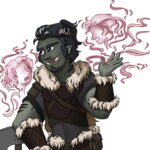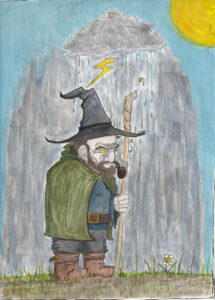You experience emotions strongly and deeply across the emotional spectrum. Because they come quickly, often without warning, you cannot prepare yourself for them and you react instinctively with little or no control.
Enjoyable Emotions. You experience 1d6 + 2 of the following in excess of typical experience: excitable, energetic, euphoric, needing less sleep, unusually talkative, racing thoughts, distractible, risk-seeking. During this time, you have a −(IE) penalty on Wisdom (Perception) checks and must succeed on a Constitution saving throw with a −(IE) penalty to maintain concentration on spells regardless of stimuli, but you need only half the necessary time for a short or long rest, and you gain + (IE) on initiative rolls.
Uncomfortable Emotions. If you are a barbarian, anytime you experience an upsetting situation, no matter how minor, you must succeed on a DC 10 + (IE) Wisdom saving throw or begin to Rage involuntarily, using up one of your daily Rages. If not a barbarian, when encountering a stressful situation, you must succeed on a DC 10 + (IE) Wisdom saving throw or become overwhelmed by fear or anger. Failure on the saving throw gives you a −(IE) penalty on all ability checks that round, and this continues each round until you succeed. You have a +(IE) bonus to Charisma (Intimidation) checks but a −(IE) penalty on Charisma (Persuasion) checks.
Real-world Examples
Depression, Anxiety, Reactive Attachment Disorder, Attention Deficit Hyperactivity Disorder, Autism, Bipolar Disorder, Borderline Personality Disorder, Complex Post-traumatic Stress Disorder, Fetal Alcohol Spectrum Disorders
Assistive Options
If an ally uses their action to help you calm down, you have advantage on the Wisdom saving throw to control your emotions.
Magical Assistance
The Calm Emotions spell can counteract this trait for the duration, but immediately after the spell ends, the target must succeed on the Wisdom saving throw as noted, even if the stressful stimulus is gone.


 You have the overwhelming feeling that your circumstances will only get worse, either your immediate circumstances or your entire life or both (and which of those doesn’t matter). While experiencing this, you lose advantage on all ability checks.
You have the overwhelming feeling that your circumstances will only get worse, either your immediate circumstances or your entire life or both (and which of those doesn’t matter). While experiencing this, you lose advantage on all ability checks.